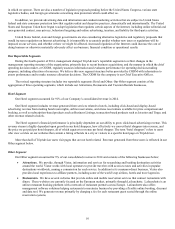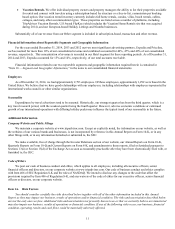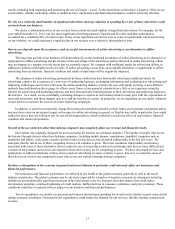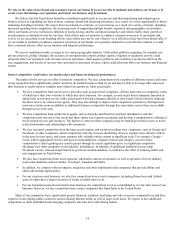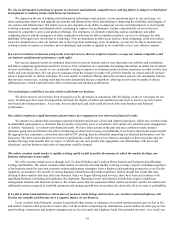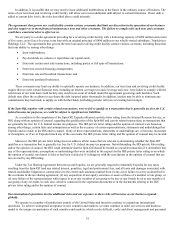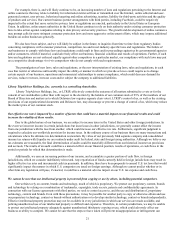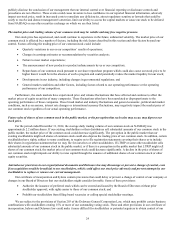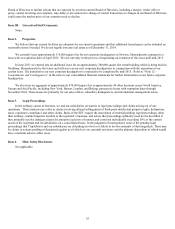TripAdvisor 2014 Annual Report Download - page 29
Download and view the complete annual report
Please find page 29 of the 2014 TripAdvisor annual report below. You can navigate through the pages in the report by either clicking on the pages listed below, or by using the keyword search tool below to find specific information within the annual report.19
In addition, it is possible that we may need to incur additional indebtedness in the future in the ordinary course of business. The
terms of our term loan and revolving credit facility will allow us to incur additional debt subject to certain limitations. If new debt is
added to current debt levels, the risks described above could intensify.
The agreements that govern our credit facility contain various covenants that limit our discretion in the operation of our business
and also require us to meet financial maintenance tests and other covenants. The failure to comply with such tests and covenants
could have a material adverse effect on us.
We are party to a credit agreement providing for a revolving credit facility with a borrowing capacity of $200 million and a term
of five years, as well as a five-year, term loan with an original principal of $400 million to our wholly-owned subsidiary, TripAdvisor
Holdings, LLC. The agreements that govern the term loan and revolving credit facility contain various covenants, including those that
limit our ability to, among other things:
x Incur indebtedness;
x Pay dividends on, redeem or repurchase our capital stock;
x Enter into certain asset sale transactions, including partial or full spin-off transactions;
x Enter into secured financing arrangements;
x Enter into sale and leaseback transactions; and
x Enter into unrelated businesses.
These covenants may limit our ability to optimally operate our business. In addition, our term loan and revolving credit facility
require that we meet certain financial tests, including an interest coverage test and a leverage ratio test. Any failure to comply with the
restrictions of our term loan credit facility may result in an event of default under the agreements governing such facilities. Such
default may allow the creditors to accelerate the debt incurred under thereunder. In addition, lenders may be able to terminate any
commitments they had made to supply us with further funds (including periodic rollovers of existing borrowings).
If the Spin-Off, together with certain related transactions, were to fail to qualify as a transaction that is generally tax free for U.S.
federal income tax purposes, we could be subject to significant tax liabilities.
As a condition to the completion of the Spin-Off, Expedia obtained a private letter ruling from the Internal Revenue Service, or
IRS, along with an opinion of counsel, regarding the qualification of the Spin-Off and certain related transactions, as transactions that
are generally tax free for U.S. federal income tax purposes. The IRS private letter ruling and the opinion of counsel were based on,
among other things, certain facts and assumptions as well as the accuracy of certain representations, statements and undertakings that
Expedia and we made to the IRS and to counsel. If any of these representations, statements or undertakings are, or become, inaccurate
or incomplete, or if we or Expedia breach any of the covenants, the IRS private letter ruling and the opinion of counsel may be invalid.
Moreover, the IRS private letter ruling does not address all the issues that are relevant to determining whether the Spin-Off
qualifies as a transaction that is generally tax free for U.S. federal income tax purposes. Notwithstanding the IRS private letter ruling
and/or the opinion of counsel, the IRS could determine that the Spin-Off should be treated as a taxable transaction if it determines that
any of the representations, assumptions or undertakings that were included in the request for the IRS private letter ruling or on which
the opinion of counsel was based is false or has been violated or if it disagrees with the conclusions in the opinion of counsel that are
not covered by any IRS ruling.
Under the Tax Sharing Agreement between us and Expedia, we are generally required to indemnify Expedia for any taxes
resulting from the Spin-Off (and any related interest, penalties, legal and professional fees, and all costs and damages associated with
related stockholder litigation or controversies) to the extent such amounts resulted from (i) any act or failure to act by us described in
the covenants in the tax sharing agreement, (ii) any acquisition of our equity securities or assets or those of a member of our group, or
(iii) any failure of the representations with respect to us or any member of our group to be true or any breach by us or any member of
our group of any covenant, in each case, which is contained in the separation documents or in the documents relating to the IRS
private letter ruling and/or the opinion of counsel.
Our international operations involve additional risks and our exposure to these risks will increase as our business expands
globally.
We operate in a number of jurisdictions outside of the United States and intend to continue to expand our international
operations. To achieve widespread acceptance in new countries and markets, we must continue to tailor our services and business
model to the unique circumstances of such countries and markets, which can be difficult, costly and divert management and personnel



